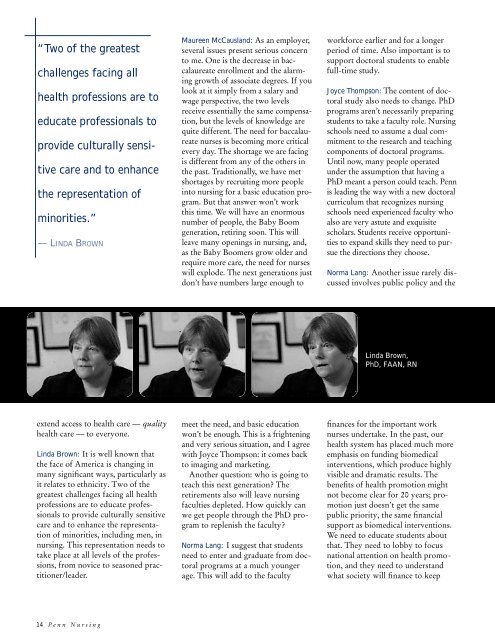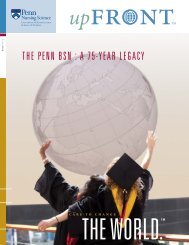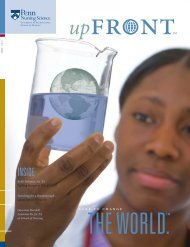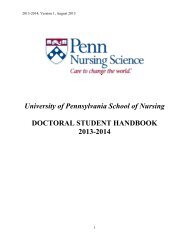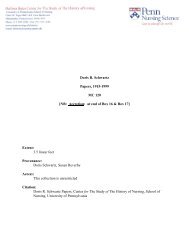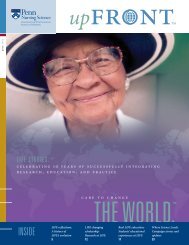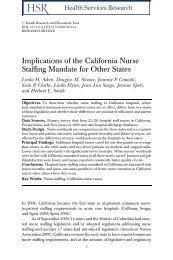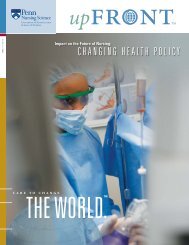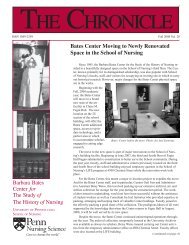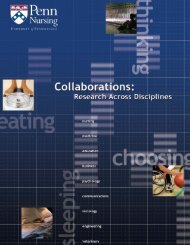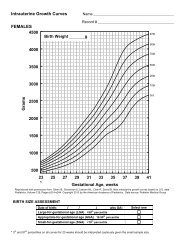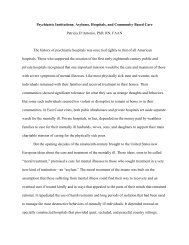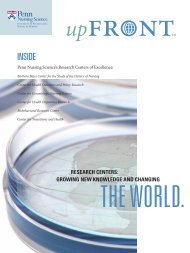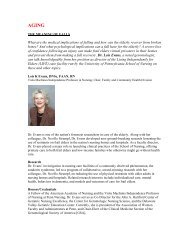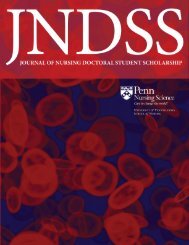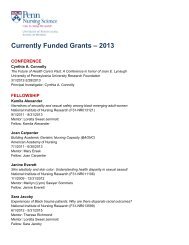Innovations: Nursing Science, Education, Practice - University of ...
Innovations: Nursing Science, Education, Practice - University of ...
Innovations: Nursing Science, Education, Practice - University of ...
You also want an ePaper? Increase the reach of your titles
YUMPU automatically turns print PDFs into web optimized ePapers that Google loves.
“ Two <strong>of</strong> the greatest<br />
challenges facing all<br />
health pr<strong>of</strong>essions are to<br />
educate pr<strong>of</strong>essionals to<br />
provide culturally sensitive<br />
care and to enhance<br />
the representation <strong>of</strong><br />
m i n o r i t i e s .”<br />
— LI N D A BR O W N<br />
Maureen McCausland: As an employer,<br />
several issues present serious concern<br />
to me. One is the decrease in bacc<br />
a l a u reate enrollment and the alarming<br />
growth <strong>of</strong> associate degrees. If you<br />
look at it simply from a salary and<br />
wage perspective, the two levels<br />
receive essentially the same compensation,<br />
but the levels <strong>of</strong> knowledge are<br />
quite diff e rent. The need for baccalaureate<br />
nurses is becoming more critical<br />
e v e ry day. The shortage we are facing<br />
is diff e rent from any <strong>of</strong> the others in<br />
the past. Tr a d i t i o n a l l y, we have met<br />
s h o rtages by re c ruiting more people<br />
into nursing for a basic education program.<br />
But that answer won’t work<br />
this time. We will have an enorm o u s<br />
number <strong>of</strong> people, the Baby Boom<br />
generation, retiring soon. This will<br />
leave many openings in nursing, and,<br />
as the Baby Boomers grow older and<br />
re q u i re more care, the need for nurses<br />
will explode. The next generations just<br />
d o n ’t have numbers large enough to<br />
workforce earlier and for a longer<br />
period <strong>of</strong> time. Also important is to<br />
support doctoral students to enable<br />
full-time study.<br />
Joyce Thompson: The content <strong>of</strong> doctoral<br />
study also needs to change. PhD<br />
p rograms are n ’t necessarily pre p a r i n g<br />
students to take a faculty role. <strong>Nursing</strong><br />
schools need to assume a dual commitment<br />
to the re s e a rch and teaching<br />
components <strong>of</strong> doctoral pro g r a m s .<br />
U ntil now, many people operated<br />
under the assumption that having a<br />
PhD meant a person could teach. Penn<br />
is leading the way with a new doctoral<br />
c u rriculum that recognizes nursing<br />
schools need experienced faculty who<br />
also are very astute and exquisite<br />
scholars. Students receive opport u n i-<br />
ties to expand skills they need to pursue<br />
the directions they choose.<br />
Norma Lang: Another issue rarely discussed<br />
involves public policy and the<br />
Linda Brown,<br />
PhD, FAAN, RN<br />
extend access to health care — q u a l i t y<br />
health care — to everyone.<br />
Linda Brown: It is well known that<br />
the face <strong>of</strong> America is changing in<br />
many significant ways, particularly as<br />
it relates to ethnicity. Two <strong>of</strong> the<br />
greatest challenges facing all health<br />
pr<strong>of</strong>essions are to educate pr<strong>of</strong>essionals<br />
to provide culturally sensitive<br />
care and to enhance the representation<br />
<strong>of</strong> minorities, including men, in<br />
nursing. This representation needs to<br />
take place at all levels <strong>of</strong> the pr<strong>of</strong>essions,<br />
from novice to seasoned practitioner/leader.<br />
meet the need, and basic education<br />
w o n ’t be enough. This is a frightening<br />
and very serious situation, and I agre e<br />
with Joyce Thompson: it comes back<br />
to imaging and marketing.<br />
Another question: who is going to<br />
teach this next generation? The<br />
retirements also will leave nursing<br />
faculties depleted. How quickly can<br />
we get people through the PhD program<br />
to replenish the faculty?<br />
Norma Lang: I suggest that students<br />
need to enter and graduate from doctoral<br />
programs at a much younger<br />
age. This will add to the faculty<br />
finances for the important work<br />
nurses undertake. In the past, our<br />
health system has placed much more<br />
emphasis on funding biomedical<br />
interventions, which produce highly<br />
visible and dramatic results. The<br />
benefits <strong>of</strong> health promotion might<br />
not become clear for 20 years; promotion<br />
just doesn’t get the same<br />
public priority, the same financial<br />
support as biomedical interventions.<br />
We need to educate students about<br />
that. They need to lobby to focus<br />
national attention on health promotion,<br />
and they need to understand<br />
what society will finance to keep<br />
14 P e n n N u r s i n g


